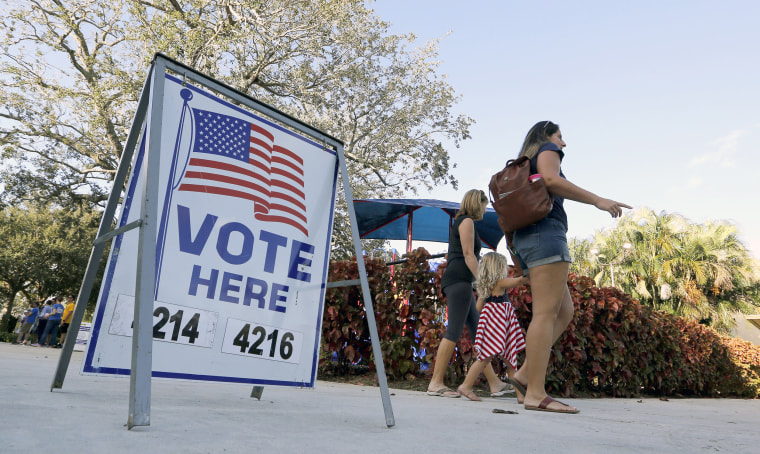Civil rights advocates are celebrating a significant voting rights win after U.S. District Judge Mark E. Walker ordered 32 Florida counties to provide election materials and assistance to Spanish-speaking voters ahead of the midterm elections in November.
Walker's decision comes after several civic engagement groups filed a suit, in August, against the Florida secretary of state and 32 Florida counties for what they say is a violation of the Voting Rights Act of 1965 for not making available bilingual voting materials and assistance to the state's growing number of Spanish speakers, in particular, Puerto Rican voters who have moved from the island.
Puerto Ricans are born with U.S. citizenship; once they move to the mainland they can register and vote in elections. But many of those raised on the island speak primarily Spanish.
After Hurricane Maria ravaged the island 11 months ago, over 56,000 Puerto Ricans relocated to Florida, according to the most recent data from the Center for Puerto Rican Studies at Hunter College in New York.
They joined a massive wave that began in 2006 after the island’s economic crisis, boosting Florida's Puerto Rican population from 479,000 in 2000 to over 1 million in 2015, according to the Pew Research Center.
“While lost on some, Puerto Rico is part of the United States,” Walker noted in his decision. "It is remarkable that it takes a coalition of voting rights organizations and individuals to sue in federal court to seek minimal compliance with the plain language of a venerable 53-year-old law."
According to LatinoJustice PRLDEF, which represented the plaintiffs in the case alongside Demos, section 4E of the Voting Rights Act guarantees the right to register and vote for those with limited English and specifically points out Puerto Ricans.
It states that registering and voting cannot be denied to those “who have completed the 6th grade in a public school, such as those in Puerto Rico, where the predominant classroom language is a language other than English,” according to the Justice Department website.
“We are delighted that Judge Walker granted a partial preliminary injunction ordering the 32 counties and the secretary of state to comply with Section 4(e) of the Voting Rights Act. Every vote counts, and this order goes a long way to make sure that Puerto Rican voters educated in Puerto Rico in Spanish, who need Spanish language materials and assistance are able (to) cast an informed vote in the 2018 midterms," said Kira Romero-Craft, managing attorney for LatinoJustice PRLDEF’s southeast office.
"Individuals who are still dealing with devastating losses from Hurricane Maria should not also have to contend with discrimination at the polls,” said Stuart Naifeh, senior counsel at Demos. “The court’s order protects the right of Spanish-speaking Puerto Rican citizens to meaningfully exercise their right to vote this fall.”
FOLLOW NBC LATINO ON FACEBOOK, TWITTER AND INSTAGRAM.

